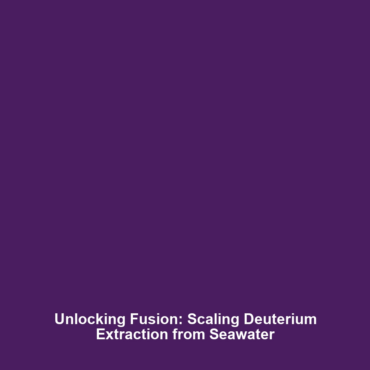Mining and Extraction: Scaling Technologies for Deuterium in Fusion Energy
As the quest for sustainable energy solutions intensifies, fusion energy stands out for its potential to provide virtually limitless power. A critical element in this process is deuterium—a stable isotope of hydrogen that is naturally abundant in seawater. However, despite its abundance, the technologies for deuterium extraction from seawater must be significantly scaled for practical and commercial applications in fusion energy. Understanding the mining and extraction process is crucial for transforming this theoretical potential into a functional energy source.
Key Concepts in Mining and Extraction of Deuterium
Mining and extraction of deuterium from seawater involve several core concepts:
- Deuterium Abundance: Deuterium accounts for approximately 0.0156% of all hydrogen in seawater, making it a plentiful resource for energy generation.
- Extraction Techniques: Methods such as ion-exchange, distillation, and membrane technology are currently explored for effective deuterium extraction.
- Fusion Process: Deuterium is pivotal in nuclear fusion reactions, where it fuses with tritium to produce helium and energy.
Applications and Real-World Uses
The mining and extraction of deuterium are directly related to several applications in fusion energy:
- Fusion Reactors: Deuterium serves as a fuel for experimental reactors like ITER, which aim to demonstrate the feasibility of fusion as an energy source.
- Energy Production: Deuterium-infused fusion processes could provide a cleaner alternative to fossil fuels, reducing greenhouse gas emissions.
- Scientific Research: Ongoing studies into fusion technology rely on deuterium as a key component to understand nuclear reactions at a larger scale.
Current Challenges in Mining and Extraction
Despite the promise of deuterium as an energy source, several challenges persist in mining and extraction technologies:
- Cost-Effectiveness: Existing extraction methods are costly, limiting their economic viability for large-scale operations.
- Scalability: Current technologies need significant advancements to scale up effectively for commercial fusion applications.
- Environmental Impact: The potential environmental effects of seawater extraction processes must be considered and mitigated.
Future Research and Innovations
Looking forward, research in mining and extraction technologies is essential for advancing fusion energy. Innovations on the horizon include:
- Advanced Membrane Technologies: New materials that enhance deuterium selectivity and reduce costs are under investigation.
- Efficient Ion-Exchange Methods: Improved ion-exchange systems that offer faster and more efficient extraction processes are being developed.
- Automated Extraction Facilities: Innovations in automation could streamline the extraction process and reduce reliance on human labor.
Conclusion
The mining and extraction of deuterium from seawater play a pivotal role in the advancement of fusion energy. While challenges remain, ongoing research and technological innovations hold the promise for scalable solutions necessary to harness this abundant resource effectively. Continuous support for research in this field can aid the transition towards a sustainable energy future. For more information on related topics, check out our articles on fusion energy technology and renewable energy resources.

Leave a Reply